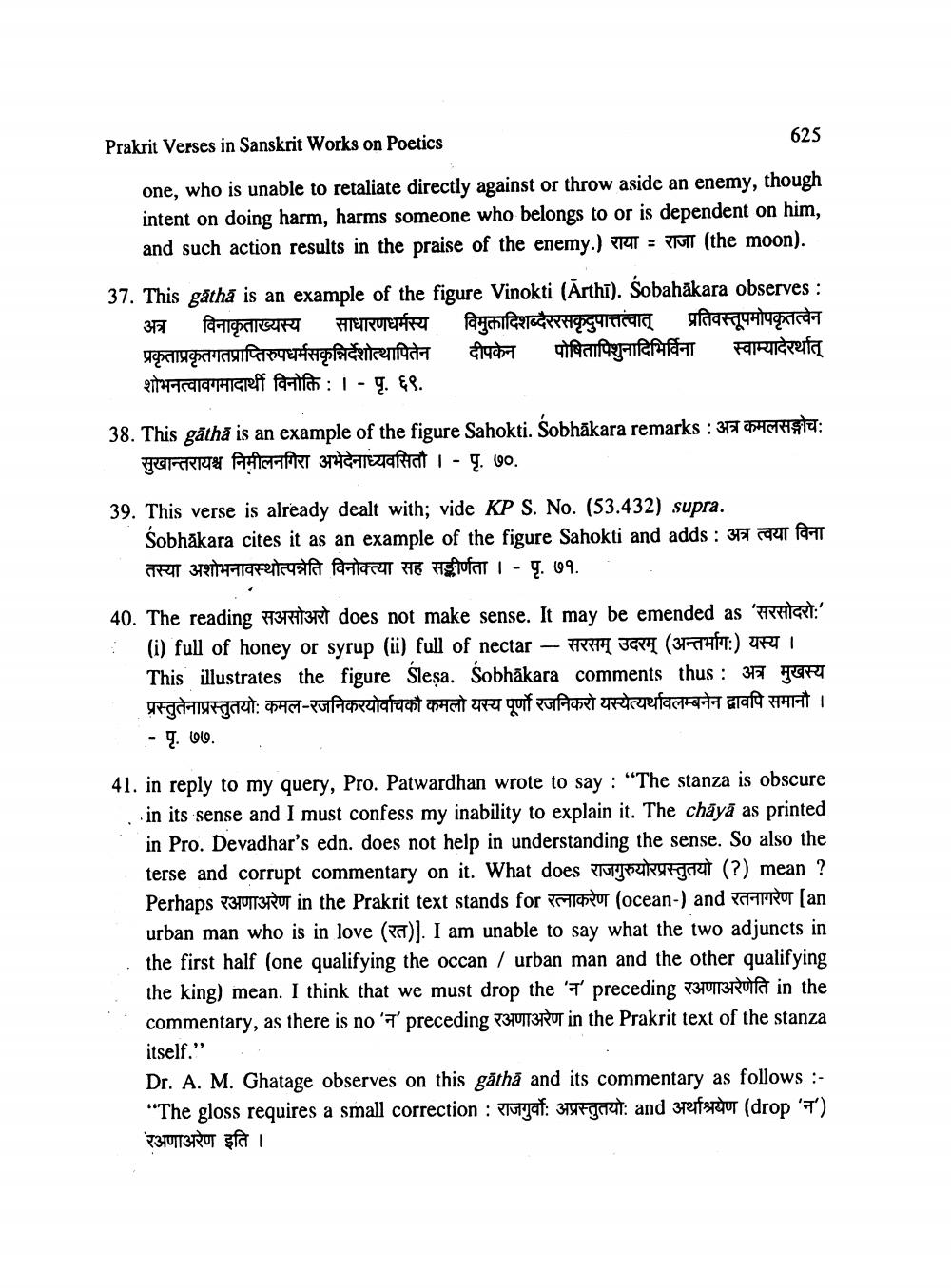________________
Prakrit Verses in Sanskrit Works on Poetics
625
one, who is unable to retaliate directly against or throw aside an enemy, though intent on doing harm, harms someone who belongs to or is dependent on him, and such action results in the praise of the enemy.) राया = राजा (the moon).
37. This gatha is an example of the figure Vinokti (Arthi). Sobahakara observes :
अत्र विनाकृताख्यस्य साधारणधर्मस्य विमुक्तादिशब्दैररसकदुपात्तत्वात् प्रतिवस्तूपमोपकृतत्वेन प्रकृताप्रकृतगतप्राप्तिरुपधर्मसकृन्निर्देशोत्थापितेन दीपकेन पोषितापिशनादिभिर्विना स्वाम्यादेरर्थात शोभनत्वावगमादार्थी विनोक्ति: । - पृ. ६९.
38. This gatha is an example of the figure Sahokti. Sobhakara remarks : अत्र कमलसङ्गोच:
सुखान्तरायश्च निमीलनगिरा अभेदेनाध्यवसितौ । - पृ. ७०.
39. This verse is already dealt with; vide KP S. No. (53.432) supra.
Sobhakara cites it as an example of the figure Sahokti and adds : अत्र त्वया विना तस्या अशोभनावस्थोत्पन्नेति विनोक्त्या सह सङ्कीर्णता । - पृ. ७१.
40. The reading सअसोअरो does not make sense. It may be emended as 'सरसोदरो:'
(i) full of honey or syrup (ii) full of nectar - सरसम उदरम् (अन्तर्भाग:) यस्य ।। This illustrates the figure Slesa. Sobhakara comments thus : अत्र मुखस्य प्रस्तुतेनाप्रस्तुतयो: कमल-रजनिकरयोर्वाचकौ कमलो यस्य पूर्णो रजनिकरो यस्येत्यर्थावलम्बनेन द्वावपि समानौ । - पृ. ७७.
41. in reply to my query, Pro. Patwardhan wrote to say : "The stanza is obscure
in its sense and I must confess my inability to explain it. The chāyā as printed in Pro. Devadhar's edn. does not help in understanding the sense. So also the terse and corrupt commentary on it. What does राजगुरुयोरप्रस्तुतयो (?) mean ? Perhaps रअणाअरेण in the Prakrit text stands for रत्नाकरेण (ocean-) and रतनागरेण [an urban man who is in love (a)). I am unable to say what the two adjuncts in the first half (one qualifying the occan / urban man and the other qualifying the king) mean. I think that we must drop the 'T' preceding 7370113 Rulla in the commentary, as there is no '' preceding 737UT3RUT in the Prakrit text of the stanza
itself.”
Dr. A. M. Ghatage observes on this gatha and its commentary as follows :"The gloss requires a small correction : राजगुर्वो: अप्रस्तुतयो: and अर्थाश्रयेण (drop 'न') 'रअणाअरेण इति ।




